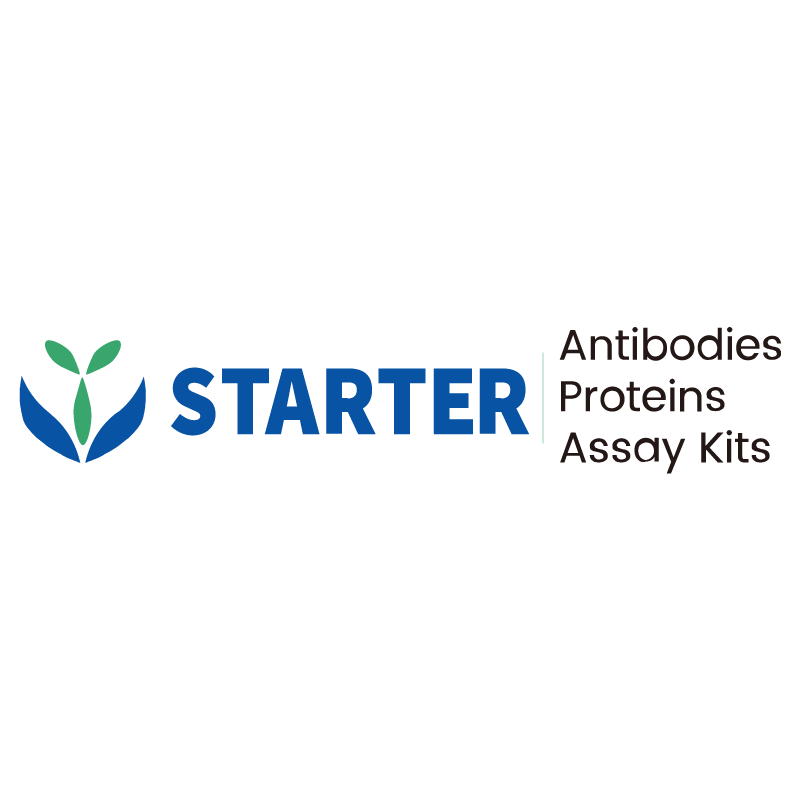WB result of TIM-1 Recombinant Rabbit mAb
Primary antibody: TIM-1 Recombinant Rabbit mAb at 1/1000 dilution
Lane 1: HEK-293 whole cell lysate 20 µg
Lane 2: Caco-2 whole cell lysate 20 µg
Secondary antibody: Goat Anti-rabbit IgG, (H+L), HRP conjugated at 1/10000 dilution
Predicted MW: 39 kDa
Observed MW: 55 kDa
Product Details
Product Details
Product Specification
| Host | Rabbit |
| Antigen | TIM-1 |
| Synonyms | Hepatitis A virus cellular receptor 1; HAVcr-1; Kidney injury molecule 1 (KIM-1); T-cell immunoglobulin and mucin domain-containing protein 1 (TIMD-1); T-cell immunoglobulin mucin receptor 1 (TIM; TIM-1); T-cell membrane protein 1; CD365; HAVCR1; KIM1; TIM1; TIMD1 |
| Immunogen | Synthetic Peptide |
| Location | Cell membrane |
| Accession | Q96D42 |
| Clone Number | S-1555-147 |
| Antibody Type | Recombinant mAb |
| Isotype | IgG |
| Application | WB, IHC-P, ICC |
| Reactivity | Hu |
| Positive Sample | HEK-293, Caco-2, HeLa |
| Purification | Protein A |
| Concentration | 0.5 mg/ml |
| Conjugation | Unconjugated |
| Physical Appearance | Liquid |
| Storage Buffer | PBS, 40% Glycerol, 0.05% BSA, 0.03% Proclin 300 |
| Stability & Storage | 12 months from date of receipt / reconstitution, -20 °C as supplied |
Dilution
| application | dilution | species |
| WB | 1:1000 | Hu |
| IHC-P | 1:250 | Hu |
| ICC | 1:500 | Hu |
Background
TIM-1 protein, also known as T-cell immunoglobulin and mucin domain protein-1 or kidney injury molecule-1 (KIM-1), is a type I membrane protein that plays a significant role in immune regulation. It is structurally a member of the immunoglobulin superfamily (IgSF), containing an IgV-like domain, a mucin domain, a transmembrane domain, and an intracellular cytoplasmic tail with a tyrosine phosphorylation motif. TIM-1 functions as a co-stimulatory molecule for T cell activation and is preferentially expressed on activated Th2 cells, influencing cytokine production and allergic diseases. It has also been identified as a cellular receptor for hepatitis A virus and is implicated in the clearance of apoptotic cells, suggesting its involvement in immune tolerance and the prevention of autoimmune and inflammatory diseases. Furthermore, TIM-1 is upregulated in acute kidney injury and has potential as a cancer marker, highlighting its importance in both physiological and pathological conditions.
Picture
Picture
Western Blot
Immunohistochemistry
IHC shows positive staining in paraffin-embedded human colon. Anti- TIM-1 antibody was used at 1/250 dilution, followed by a HRP Polymer for Mouse & Rabbit IgG (ready to use). Counterstained with hematoxylin. Heat mediated antigen retrieval with Tris/EDTA buffer pH9.0 was performed before commencing with IHC staining protocol.
IHC shows positive staining in paraffin-embedded human stomach. Anti- TIM-1 antibody was used at 1/250 dilution, followed by a HRP Polymer for Mouse & Rabbit IgG (ready to use). Counterstained with hematoxylin. Heat mediated antigen retrieval with Tris/EDTA buffer pH9.0 was performed before commencing with IHC staining protocol.
IHC shows positive staining in paraffin-embedded human colon cancer. Anti- TIM-1 antibody was used at 1/250 dilution, followed by a HRP Polymer for Mouse & Rabbit IgG (ready to use). Counterstained with hematoxylin. Heat mediated antigen retrieval with Tris/EDTA buffer pH9.0 was performed before commencing with IHC staining protocol.
IHC shows positive staining in paraffin-embedded human endometrial cancer. Anti- TIM-1 antibody was used at 1/250 dilution, followed by a HRP Polymer for Mouse & Rabbit IgG (ready to use). Counterstained with hematoxylin. Heat mediated antigen retrieval with Tris/EDTA buffer pH9.0 was performed before commencing with IHC staining protocol.
IHC shows positive staining in paraffin-embedded human papillary renal cell carcinoma. Anti- TIM-1 antibody was used at 1/250 dilution, followed by a HRP Polymer for Mouse & Rabbit IgG (ready to use). Counterstained with hematoxylin. Heat mediated antigen retrieval with Tris/EDTA buffer pH9.0 was performed before commencing with IHC staining protocol.
IHC shows positive staining in paraffin-embedded human papillary renal cell paracancerous. Anti- TIM-1 antibody was used at 1/250 dilution, followed by a HRP Polymer for Mouse & Rabbit IgG (ready to use). Counterstained with hematoxylin. Heat mediated antigen retrieval with Tris/EDTA buffer pH9.0 was performed before commencing with IHC staining protocol.
Immunocytochemistry
ICC shows positive staining in HeLa cells. Anti- TIM-1 antibody was used at 1/500 dilution (Green) and incubated overnight at 4°C. Goat polyclonal Antibody to Rabbit IgG - H&L (Alexa Fluor® 488) was used as secondary antibody at 1/1000 dilution. The cells were fixed with 4% PFA and permeabilized with 0.1% PBS-Triton X-100. Nuclei were counterstained with DAPI (Blue). Counterstain with tubulin (Red).
ICC shows positive staining in HEK293 cells. Anti- TIM-1 antibody was used at 1/500 dilution (Green) and incubated overnight at 4°C. Goat polyclonal Antibody to Rabbit IgG - H&L (Alexa Fluor® 488) was used as secondary antibody at 1/1000 dilution. The cells were fixed with 100% ice-cold methanol and permeabilized with 0.1% PBS-Triton X-100. Nuclei were counterstained with DAPI (Blue). Counterstain with tubulin (Red).


